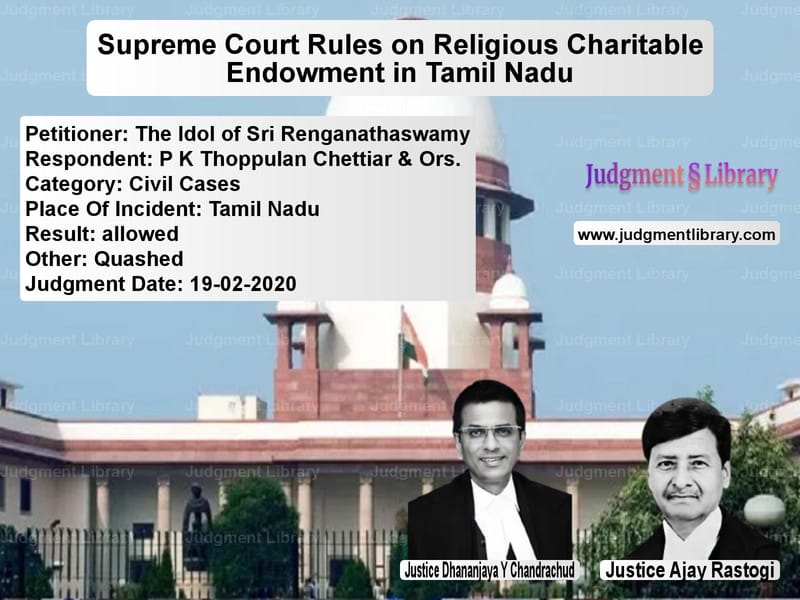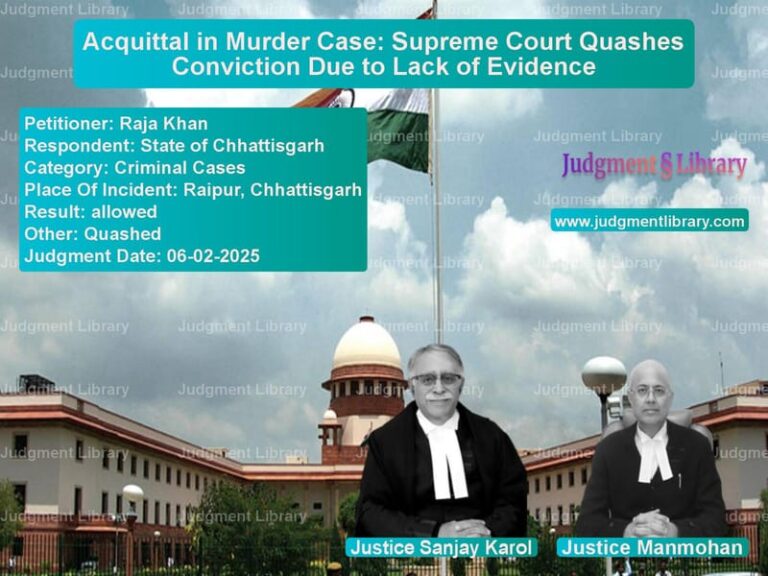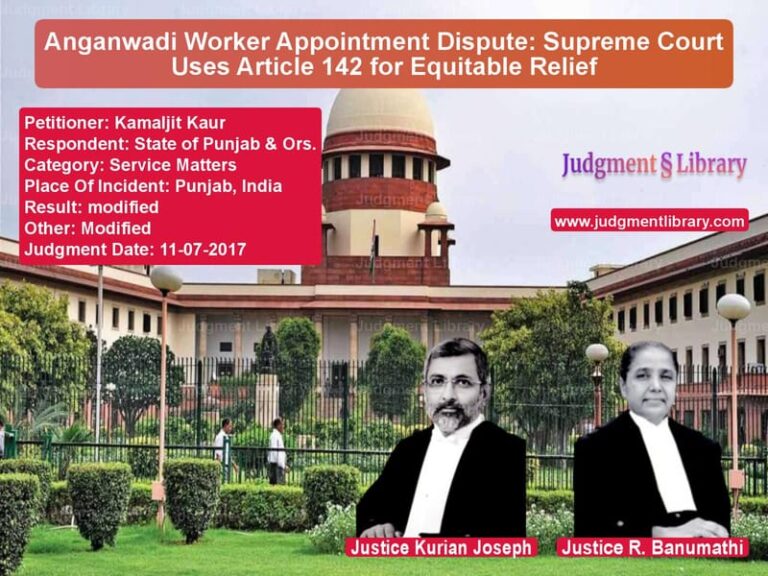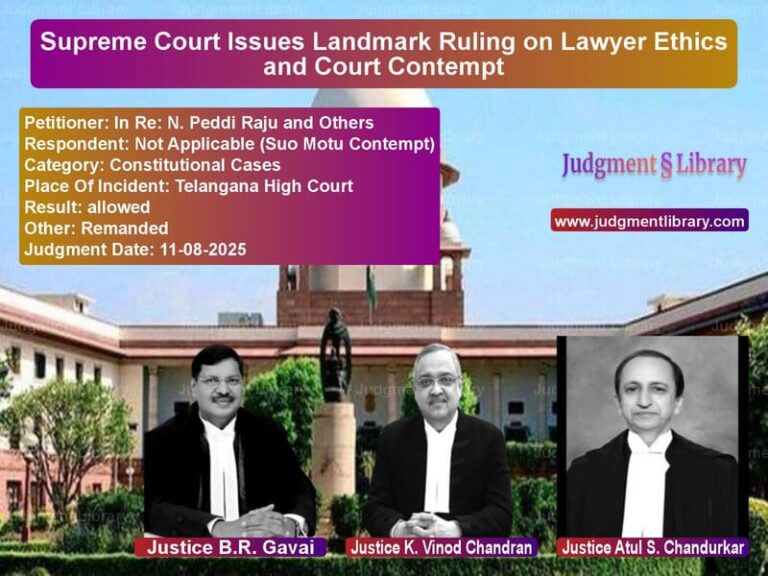Supreme Court Rules on Religious Charitable Endowment in Tamil Nadu
The case of The Idol of Sri Renganathaswamy vs. P K Thoppulan Chettiar & Ors. is a landmark judgment dealing with the nature of religious endowments under the Tamil Nadu Hindu Religious and Charitable Endowments Act, 1959. The Supreme Court overturned the Madras High Court’s decision, ruling that the property in question was a specific endowment for a religious charity and should be governed under the Act.
Background of the Case
The dispute concerned a property that was originally purchased in 1887 by Thoppulan Chettiar in Tiruchirapalli. He constructed a ‘Stone Mandapam’ for the deity Sri Renganathaswamy and carried out charitable activities, including providing food and water to devotees during Hindu festivals. In 1901, he executed a Deed of Settlement, prohibiting the sale or mortgage of the property and directing his descendants to continue the charity.
In 2001, the managing trustees of the Ramanuja Koodam Anandhana Trust (respondents) decided to sell the property (except for the Stone Mandapam) and use the proceeds to fund the charity. They sought permission from the civil court, arguing that the property was not a religious endowment and thus not governed by the Tamil Nadu Hindu Religious and Charitable Endowments Act, 1959.
The temple authorities opposed the sale, arguing that the property was dedicated for religious charity and could not be sold without government approval under Section 34 of the Act.
Arguments of the Petitioner (The Idol of Sri Renganathaswamy)
- The Deed of Settlement explicitly stated that the property was purchased for religious charity in reference to Sri Renganathaswamy.
- The property was used for charitable purposes directly connected with the temple’s religious activities.
- The trust had no right to sell the property, as it constituted a specific endowment under Section 6(19) of the 1959 Act.
- Only the Commissioner of Hindu Religious and Charitable Endowments had the authority to sanction the sale under Section 34 of the Act.
- The civil court had no jurisdiction over the matter as it fell under the purview of the Act.
Arguments of the Respondents (Trustees of Ramanuja Koodam Anandhana Trust)
- The property was a private trust and not a public religious endowment.
- The charitable activities were not restricted to Hindus and were meant for the general public.
- The temple authorities never exercised control over the trust or the property.
- The trust needed to sell the property due to encroachments and practical difficulties in maintaining it.
- The sale proceeds would be used to continue the charitable activities, fulfilling the original intent of the settlor.
Supreme Court’s Judgment
A bench comprising Justice Dhananjaya Y Chandrachud and Justice Ajay Rastogi ruled in favor of the temple authorities and set aside the Madras High Court’s decision. The Court made the following key observations:
“The Deed of Settlement explicitly states that the property was purchased for performing charity related to Sri Renganathaswamy sanctum. This constitutes a specific endowment as defined under the Act.”
The Court further clarified that a religious charity need not be directly managed by a temple to be considered a religious endowment:
“A religious charity is one associated with Hindu festivals or religious observances, regardless of whether it is managed by a temple. The property in question was used to serve devotees during religious festivals.”
On the issue of sale of the property, the Court ruled:
“Under Section 34 of the Act, any sale of immovable property belonging to a religious institution requires the sanction of the Commissioner and government approval. The civil court has no jurisdiction over such matters.”
Addressing the argument that the property was a private trust, the Court held:
“The property was dedicated for public charity associated with Hindu religious observances. It, therefore, qualifies as a specific endowment under Section 6(19) of the Act.”
The Court concluded by stating:
“The respondents are at liberty to follow the prescribed procedure under the Act if they wish to sell the property. However, they cannot bypass the statutory requirements by approaching a civil court.”
Key Takeaways from the Judgment
- Religious charities associated with temples are specific endowments: Even if a temple does not directly manage a charity, if it serves religious purposes, it falls under the Tamil Nadu Hindu Religious and Charitable Endowments Act.
- Sale of endowed property requires government approval: Trustees cannot unilaterally sell property used for religious charity without following the prescribed procedure.
- Civil courts have no jurisdiction over religious endowments: Matters relating to religious institutions must be decided by the authorities under the 1959 Act.
- Public benefit does not negate religious character: A trust serving a general public purpose can still be classified as a religious endowment if it is connected with religious observances.
Impact of the Judgment
This ruling has significant implications for the administration of religious endowments in India:
- It prevents unauthorized sales of religious properties.
- It reinforces the authority of the Tamil Nadu Hindu Religious and Charitable Endowments Department.
- It ensures that religious endowments remain dedicated to their intended purpose.
- It sets a precedent for similar cases involving disputes over temple-related properties.
Conclusion
The Supreme Court’s decision in The Idol of Sri Renganathaswamy vs. P K Thoppulan Chettiar & Ors. underscores the importance of preserving religious endowments and ensuring they are managed as per the applicable laws. By ruling that the property was a specific endowment and subject to government oversight, the Court has upheld the sanctity of religious charities and prevented their unauthorized alienation.
Petitioner Name: The Idol of Sri Renganathaswamy.Respondent Name: P K Thoppulan Chettiar & Ors..Judgment By: Justice Dhananjaya Y Chandrachud, Justice Ajay Rastogi.Place Of Incident: Tamil Nadu.Judgment Date: 19-02-2020.
Don’t miss out on the full details! Download the complete judgment in PDF format below and gain valuable insights instantly!
Download Judgment: The Idol of Sri Reng vs P K Thoppulan Chetti Supreme Court of India Judgment Dated 19-02-2020.pdf
Direct Downlaod Judgment: Direct downlaod this Judgment
See all petitions in Property Disputes
See all petitions in Succession and Wills
See all petitions in Contract Disputes
See all petitions in Judgment by Dhananjaya Y Chandrachud
See all petitions in Judgment by Ajay Rastogi
See all petitions in allowed
See all petitions in Quashed
See all petitions in supreme court of India judgments February 2020
See all petitions in 2020 judgments
See all posts in Civil Cases Category
See all allowed petitions in Civil Cases Category
See all Dismissed petitions in Civil Cases Category
See all partially allowed petitions in Civil Cases Category







